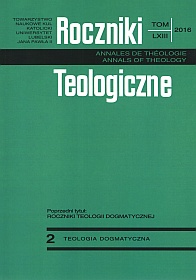The Humanity of God in Karl Barth's Christological Interpretation
Abstract
The article shows the key aspects of the Christological approach to Karl Barth's teaching about “the humanity of God”. The author argues that in the mirror of Jesus Christ's humanity the humanity of God included in Jesus's divine nature is revealed. It is in Jesus Christ that kenosis and gloria, humanum and divinum meet in an amazing way; and in the negotiating space which is constituted by His Person they explain each other, speaking more sonorously with their own voice. Hence the point of departure for a reflection on the problem that is posed here, is looking closely at the formal basis of Barth's theology. Jesus Christ's central place – with respect to the contents, form and method – is considered to be one of its most important attributes. The author of Die Kirchliche Dogmatik starts his argument by discussing Jesus Christ's pre-existence with the help of the doctrine of “the gracious election” that is a modified conception of his earlier Trinitarian theology. It says that God “from the beginning” is directed to man, suggesting a pro-human character of God's being and acting. In the light of Barth's doctrine Jesus Christ, as the second Person of the Trinity, is not only the object of election”, but He is also the electing subject. As the One Who Wants to complete the Father's salutary work, he is the justification and guarantee of our salvation. Barth categorically pronounces himself in favor of the Christological paradigm of the Revelation saying that around history and the dialogue, in which God and a man meet and are together – around a mutually made and kept relation – there is the most complete opening and exchange. It happens in the Person, since Jesus Christ is in the only and in the highest degree: a true God's man (Gott des Menschen) and a true Divine Man (Mensch Gottes). The phrase about the “humanity of God” – is Emmanuel, to whom we pass from the Christological centre, taking into consideration the theological and anthropological consequences following this movement.
References
Awad N.G., Is Perichoresis between Theological Interpretation and Historical Criticism Possible?, „Theological Review” 31(2010), nr 2, s. 152-178.
Balthasar H.U. von, Teodramatyka. Osoby dramatu. Osoby w Chrystusie, 2/2, tł. W. Szymona, Kraków 2003.
Balthasar H.U. von, The Theology of Karl Barth, San Francisco 1992.
Barth G., Karl Barth's doctrine of Menschlichkeit Gottes. The theological and hermeneutical implications, „Studies in Logic Grammar and Rhetoric” 44(57)2016 (w druku).
Barth K., Church Dogmatics, Edinburgh 1956-1975.
Barth K., Die Menschlichkeit Gottes, „Theologische Studien. Eine Schriftenreihe” 1956, H. 48.
Cassidy J.J., Election and Trinity, „The Westminster Theological Journal” 71(2009), s. 53-81.
Cortez M., What does it mean to call Karl Barth a „christocentric” theologian?, „Scottish Journal of Theology” 60(2007), nr 2, s. 1-17.
Grillmeier A., Jesus der Christus im Glauben der Kirche. Das Konzil von Chalkedon – Rezeption und Widerspruch (451-518), t. 2/1, Freiburg−Basel−Wien 19912.
Grillmeier A., Moderne Hermeneutik und Altkirchliche Christologie, w: tenże, Mit ihm und in ihm. Christologische Forschungen und Perspektiven, Freiburg−Basel−Wien 19782, s. 489-582.
Hunsinger G., How to Read Karl Barth: The Shape of His Theology, New York 1991.
Johnson W.S., Mystery of God. Karl Barth and the Postmodern Foundations of Theology, Louisville 1997.
Marion J.L., Dieu sans Dieu sans l'être: Hors-texte, Paris 1982 (pol. Bóg bez bycia, tł. M. Frankiewicz, Kraków 1996).
McCormack B.L., Grace and Being: The Role of God's Gracious Election in Karl Barth's Theological Ontology, w: The Cambridge Companion to Karl Barth, red. J. Webster, Cambridge 2000.
Nossol A., Chrystologia Karola Bartha. Wpływ na współczesną chrystologię katolicką, Lublin 1979.
O'Neil M., Karl Barth's Doctrine of Election, „Evangelical Quarterly” 76(2004), s. 311-326.
Pascal, Myśli, tł. T. Boy-Żeleński, Warszawa 1983.
Webster J., Barth's Ethics of Reconciliation, Cambridge 1995.
Webster J., Introduction to God's Being Is in Becoming: The Trinitarian Being of God in the Theology of Karl Barth, Grand Rapids 2001.
Copyright (c) 2016 Roczniki Teologiczne

This work is licensed under a Creative Commons Attribution-NonCommercial-NoDerivatives 4.0 International License.





